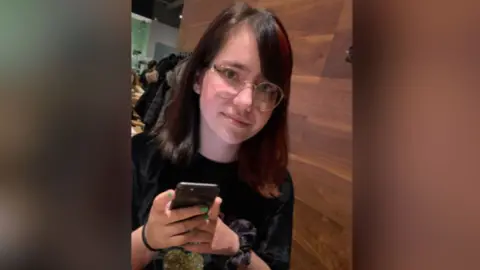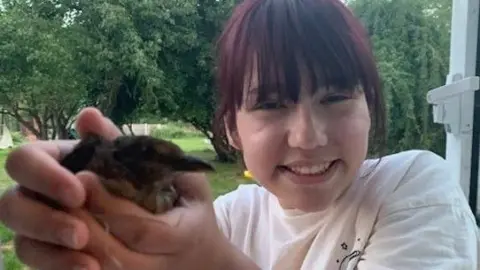'We were short-staffed', NHS boss tells inquest
 Family handout
Family handoutA clinical lead criticised staff shortages and NHS budgets at an inquest into the death of a teenager at a mental health unit.
Elise Sebastian was 16 years old when she was found unresponsive in her bedroom at the St Aubyn Centre, Colchester, in April 2021.
At the inquest, Brian O'Donnell, clinical lead at the centre, told the jury he had "constantly" raised concerns about staffing numbers with senior management.
"Our budget would always be overspent - my argument was that we were underfunded", Mr O'Donnell said.
The Essex Partnership University NHS Foundation Trust (EPUT), which runs the centre, said it should not have let her in the room unsupervised.
'Bad habits'
The inquest previously heard that Elise was supposed to receive one-to-one care, but an alert system - linked with her bedroom - was muted and she was left alone for 28 minutes.
Mr O'Donnell, who was the ward manager at the time, told the jury how staff were being asked on occasions to check as many as 15 patients with less than a minute to speak to each one.
"Looking back, it's unbelievable that we used to do that", he told the jury, referring to it as a "tick-box exercise" where staff would look at a patient quickly and "move on".
Mr O'Donnell said staff were meant to randomise the times they checked on patients but often did not do so, "pre-populating" the patient's observation sheet with timings.
"People had got into a bad habit of doing it over the years - it was a very bad ingrained piece of practice", Mr O'Donnell said.
He added that he had written 56 letters to individual members of staff about not recording observations properly, but "no matter what I did, there always seemed to be gaps".
He added that the practice continued "even to this day".
The clinical lead said on other occasions, the patients on the ward had not been checked for hours, which left him so concerned that he reported it to the Care Quality Commission on three occasions.
 Family handout
Family handoutMr O'Donnell said the over-reliance on using agency and bank staff to cover staff shortages was "a risky strategy", and added that patients would push the boundaries with them.
"If a young person is intent on harming themselves, they'll pick weaknesses in a team," he told the inquest.
"They'll ask staff for something they know they shouldn't have until they find someone who'll let them have [it], or take them somewhere they're not meant to go."
He added: "Even the best agency or bank staff don't know the ward like we do."
'People in tears'
When asked by the area coroner, Sonia Hayes, about staffing levels, Mr O'Donnell said "the trust do look at the bare minimum that you need to cover observations - it really stretches staff".
"I've seen huge pressure on people - I've seen people in tears before," he told the jury, adding there was "real concern about safety on the wards, and staff are too worried to say anything about it".
 Family handout
Family handoutElise died in hospital two days after being found in her bedroom at the centre.
EPUT accepted its failures were "causative of [Elise's] death", and its lawyer, Pravin Fernando, said: "[It] failed in its responsibility by allowing her to enter her bedroom unsupervised."
Elise's family attended the first day of her inquest and were participating in the ongoing Lampard public inquiry, which is investigating the deaths of more than 2,000 people under mental health services in Essex over 24 years.
The Lampard Inquiry team will monitor Ms Sebastian's inquest, which is due to last for four weeks.
Follow Essex news on BBC Sounds, Facebook, Instagram and X.
